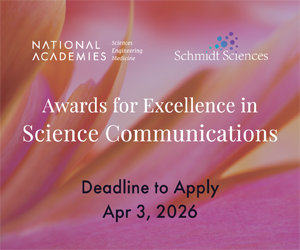Ten talented juniors and seniors from across the country gathered in Boston Feb. 14-18 to report on the American Association for the Advancement of Science meeting as NASW's undergraduate travel fellows for 2013. During the next several days, we will be posting their reports here.
Science writing news
As you probably know, Jonah Lehrer again. Lehrer gave a Fat Tuesday talk explaining away his plagiarism and other sins against science journalism. The reviews were terrible. The Knight Foundation paid him $20,000 for the talk. The reviews were terrible for that, too.
It isn't being published until April, but you can order this NASW-funded guide now at a discount from Amazon.com by using this NASW bookstore link. In the Science Writers’ Handbook, 35 science writers "share their hard-won wisdom and illuminating stories, going beyond the basics to cover everything else you need to survive and thrive as a science writer." Also, direct orders for 10% off the cover price will be available soon to NASW members.
Scientist and science communicator Ainissa Ramirez expands her 2012 TED talk, with a plan for boosting children’s interest in science, technology, engineering, and math: "In Save Our Science: How to Inspire a New Generation of Scientists, I spell out my plan for how to make science more fun again, and how to make sure that everyone has access to STEM educational opportunities."
ScienceOnline2013, the big annual conference on science and the web, begins today in Raleigh, N.C., with pre-conference workshops. If you're not there, you can take in some of the proceedings at one of more than 20 watch parties around the world, or keep an eye on the meeting's Information Central page. Also check the blogroll page for a list of posts discussing ScienceOnline2013 and its attendees.
We are pleased to announce that NASW members are eligible to receive free access to the journals of the American Physical Society. This resource allows users to access to the full-text articles in the APS journals and includes archives back to 1893. Read more to learn how to apply for access.
Hey, kids! Let's clone a Neanderthal! Why? Human genetic diversity! Alien communication! Effects of agriculture on human evolution! Because we can (maybe)! Or, none of the above. Get real, it's an absurd notion. Also, coming next week: ScienceOnline 2013! aka #scio13 UPDATED!
The NASW Education Committee is again sponsoring its annual mentoring program at the AAAS meeting in Boston, February 14-18, and we need at least 30 volunteers to act as mentors. We match veteran writers with students in graduate science writing programs or undergrads who have displayed a serious interest in science journalism. We've had a lot of interest so far from students across the country!
The National Association of Science Writers invites applications for the Laura Van Dam Travel Fellowships to this summer's meeting of the World Conference of Science Journalists in Helsinki, Finland, June 24-28, 2013. Update: We will be notifying applicants by March 12.
What's new with the flu? Well, it's an average flu season. Or maybe it's a bad flu season. We'll see. The flu therapy Tamiflu is lacking effectiveness data, and the current vaccines aren't great either. But there's hope for new vaccines effective against many flu viruses — and maybe other respiratory viruses. Not soon, though. Also: Ice recession research in Alaska. Why 'Net content goes viral. In memoriam Carl Woese, who deserved a Nobel but now won't get one.


